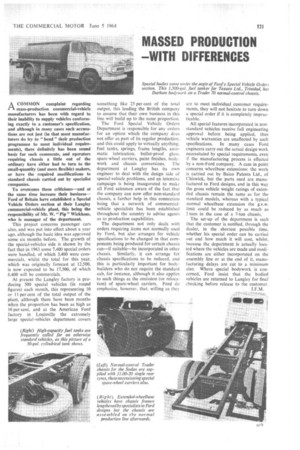MASSED PRODUCTION -WITH DIFFERENCES
Page 123

If you've noticed an error in this article please click here to report it so we can fix it.
ACOMMON complaint regarding mass-production commercial.velticle manufacturers has been with regard to their inability to supply vehicles conforming exactly to a customer's specification, and although in many cases such accusafions are not just (in that most manufachirers do try to " bend " their production programme to meet individual requirements), there definitely has been sound basis for such comments, and operators requiring chassis a little out of the ordinary have either had to turn to the small-quantity (and more flexible) makers, or have the required modifications to standard chassis carried out by specialist companies.
To overcome these crificisms—and at the same time increase their business--Ford of Britain have established a Special Vehicle Orders section at their Langley commercial-vehicle plant, this being the responsibility of Mr. W. " Pip " Wickham, who is manager of the department.
This project concerns passenger cars also, and was put into effect about a year ago, although the basic idea was approved some six months before. The growth of the special-vehicles side is shown by the fact that in 1963 some 7,400 special orders were handled, of which 3,400 were commercials, whilst the total for this year, which was originally forecast at 12,500, is now expected to be 17,500, of which 6,400 will be commercials.
At present the Langley factory is producing 500 special vehicles (in round figures) each month, this representing 10 or 11 per cent of the total output of the plant, although there have been months when the proportion has been as high as 16 percent. and at the American Ford factory in Louisville the extremely large special-vehicles department covers
something like 25 per cent of the total output, this leading the British company to assume that theirown business in this line will build up to the same proportion.
The Ford Special Vehicle Orders Department is responsible for any orders for an option which the company does not offer as part of its regular production. and this could apply to virtually anything: fuel tanks, springs, frame lengths, automatic lubrication, bullet-proof glass. spare-wheel carriers, paint finishes, bodywork and chassis conversions. The department at Langley has its own engineer to deal with the design side of special-vehicle problems, and an intensive campaign is being inaugurated to make all Ford salesmen aware of the fact that the company can now offer non-standard chassis, a further help in this connection being that a network of commercialvehicle specialists has been established throughout the country to advise agents as to production capabilities.
The department not only deals with orders requiring items not normally used by Ford, but also arranges for vehicle specifications to be changed in that components being produced for certain chassis can—if suitable—be incorporated in other chassis. Similarly, it can arrange for chassis specifications to be reduced, and this is particularly important for bodybuilders who do not require the standard cab, for instance, although it also applies to such things as the omission (or relocation) of spare-wheel carriers. Ford do emphasise, however, that. willing as they are to meet individual customer requirements, they will not hesitate to turn down a special order if it is completely impracticable.
All special features incorporated in nonstandard vehicles receive full engineering approval before being applied, thus vehicle warranties are unaffected by such specifications. In many cases Ford engineers carry out the actual design work necessitated by special requirements, even if the manufacturing process is effected by a non-Ford company. A case in point concerns wheelbase extensions: the work is carried out by Baico Patents Ltd., of Chiswick, but the parts used are manufactured to Ford designs, and in this way the gross vehicle weight ratings of extended chassis remain the same as for the standard models, whereas with a typical normal wheelbase extension the g.v.w. limit could be reduced by as much as 2 tons in the case of a 7-ton chassis.
The set-up of the department is such that the customer is notified, through the dealer, in the shortest possible time, whether his special order can be carried out and how much it will cost, whilst, because the department is actually located where the vehicles are made and modifications are either incorporated on the assembly line or at the end of it, manufacturing delays are cut to a minimum also. Where special bodywork is concerned, Ford insist that the bodied vehicles are returned to Langley for final checking before release to the customer.












































































































































































